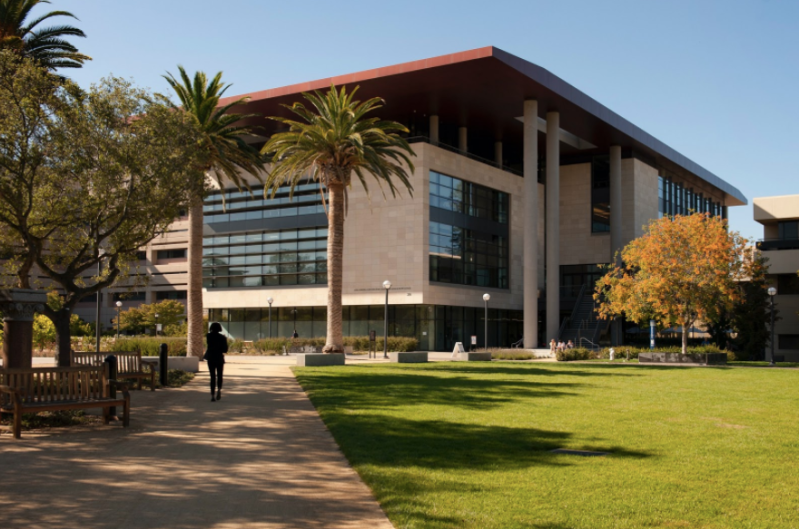The Stanford School of Medicine clarified on Wednesday that the author of a study disputing the use of face masks to prevent COVID-19 is not a current Stanford or VA Palo Alto Health Care System affiliate. The school said in a statement that it strongly endorses the use of face masks to prevent the spread of COVID-19.
The journal article, entitled “Facemasks in the COVID-19 era: A health hypothesis,” falsely claims that masking is “ineffective” in preventing the spread of the coronavirus and can cause medical conditions such as hypoxia. The article was recently circulated on social media and conservative outlets after being published online in Medical Hypotheses in November.
The author of the study, Baruch Vainshelboim, says he is affiliated with the “Cardiology Division, Veterans Affairs Palo Alto Health Care System/Stanford University” in the article.
Stanford Medicine, however, said that the author’s credentials are inaccurate and that it has requested a correction.
The school released a statement saying that Vainshelboim has not had any affiliation with the Palo Alto VA Hospital or Stanford since 2016, when he was a visiting scholar for a year “on matters unrelated to this paper.”
Vainshelboim was a postdoctoral research assistant in the lab of a VA Palo Alto Health Care System-affiliated researcher from October 2015 to September 2016, according to School of Medicine spokesperson Julie Greicius.
“He is not now and never was officially employed with the VA or Stanford,” Greicius wrote. “The terms of his contract limited the use of his VA/Stanford title to the period of his visiting scholar term.”
Vainshelboim could not be reached and Elsevier, the publisher of Medical Hypotheses, did not immediately respond to a request for comment.
Psychiatry and behavioral sciences professor David Spiegel said that the misattribution damages the reputation of the VA system, the medical school and its faculty.
“This is just nonsense,” Spiegel said of the article. “This charade of pseudo-academic presentation without any actual academic rigor is dangerous.”
The claims in Vainshelboim’s article about face masks were debunked by a number of fact checking organizations, including AFP Fact Check, the Associated Press, Snopes and PolitiFact.
Although Vainshelboim is not connected to Stanford, a handful of University affiliates, including Hoover Senior Fellow Scott Atlas and professor of medicine Jay Bhattacharya, have been criticized by public health experts for spreading misinformation.
Atlas, a radiologist who does not have a background in epidemiology and infectious disease, questioned the efficacy of masks on a number of occasions. Bhattacharya said that mask-wearing among children “is developmentally inappropriate and it just doesn’t help on the disease spread” at a recent roundtable event with the governor of Florida.
The University initially declined to take a stance on Atlas’ controversial positions on masking, herd immunity and infection in children, saying that the Hoover fellow’s views were protected by academic freedom.
After Atlas urged Michigan residents to “rise up” against new lockdown orders, Stanford issued a statement that said Atlas’s position was his alone and that his views were “inconsistent with the university’s approach in response to the pandemic.”
Spiegel said that the School of Medicine was right to swiftly disavow Vainshelboim, but added that he wished the University was just as proactive in distancing itself from Atlas.
“I was very distrubed that the school was not more forthright about criticizing Atlas,” Spiegel said, adding that Atlas “is responsible for the deaths of many Americans because he undermined good public health approaches to controlling the pandemic.”
Greicius declined to comment on Atlas but wrote that the School of Medicine’s media relations team submits correction requests to news organizations when affiliations or Stanford titles are misattributed.
“In this case, the study itself was being misrepresented as a ‘Stanford study,’ which it is not,” Greicius wrote.
The assertion that masking is “ineffective” is inconsistent with the current guidance of public health organizations, including the World Health Organization and Centers for Disease Control and Prevention. In addition, a recent meta-analysis in the Lancet concluded that “wearing face masks protects people (both health-care workers and the general public) against infection.”
Medical Hypotheses’ guidelines state that it will “consider radical, speculative and non-mainstream scientific ideas provided they are coherently expressed.”
The journal faced backlash after it published a paper that denied the established link between HIV and AIDS in 2009. The article was later withdrawn. Mehar Manku, the journal’s editor, said in 2010 that Medical Hypotheses should “publish papers that would not get accepted elsewhere.”
While both Vainshelboim and Manku have responded to acknowledge Stanford’s requested correction, according to Greicius, the school has not received confirmation of the changes.
